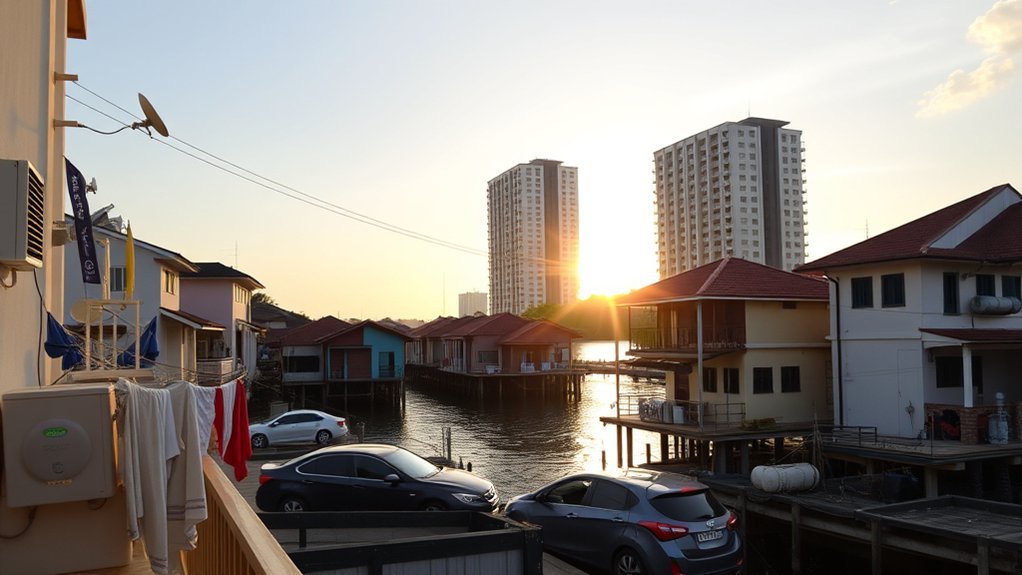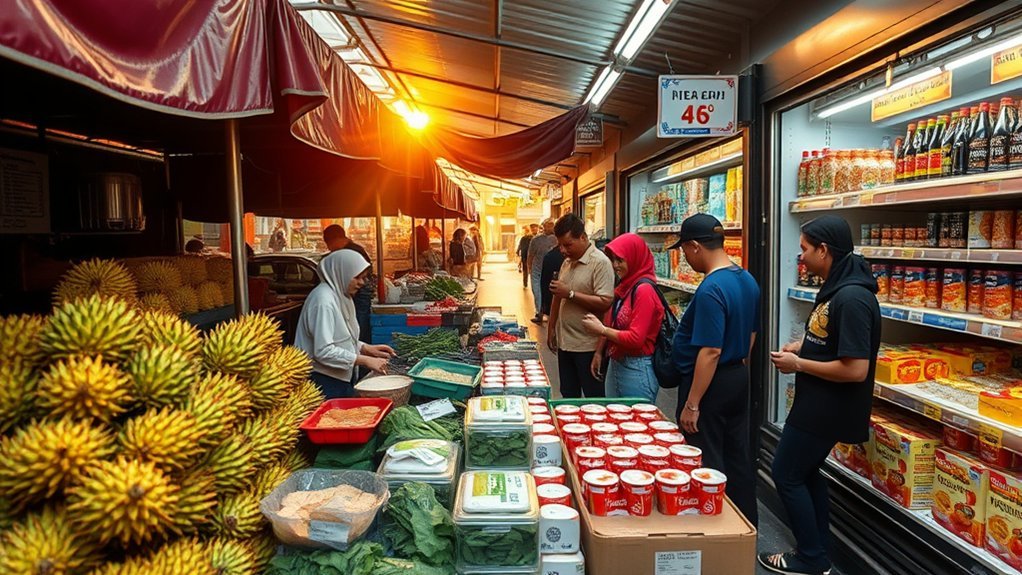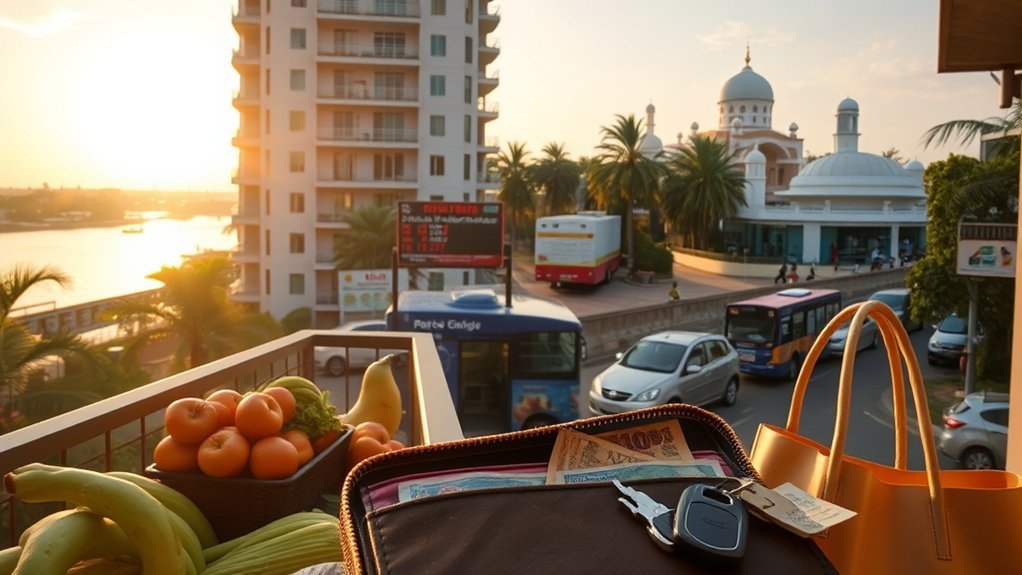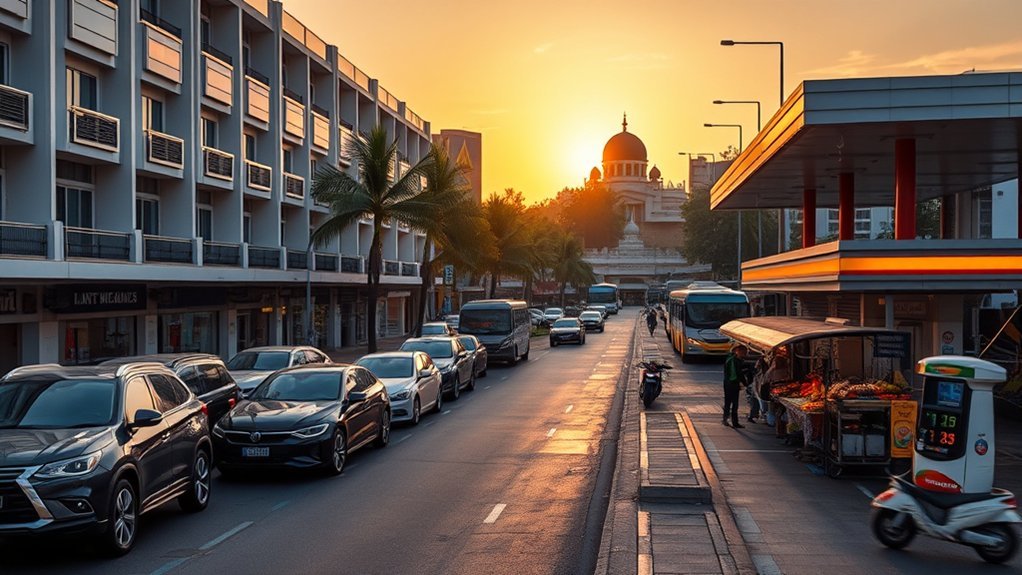You’ll typically need about B$2,351 a month as a single and around B$4,774 for a family of four to cover basic living costs in Brunei. Rent for a one‑bedroom in the city averages B$693, utilities run low (about B$38) and internet’s roughly B$60. Public transport is cheap, food and dining vary from B$3.86 lunches to B$27–77 dinners for two, and average take‑home pay sits near B$2,183—keep going to see detailed breakdowns and budgeting tips.
Monthly Living Expenses and Average Salaries in Brunei

Although Brunei’s overall costs are lower than many neighboring countries, you’ll still need to budget carefully: a single person typically spends about B$2,351 per month while a family of four averages B$4,774.
You’ll judge affordability by comparing those totals to the average salary after tax, roughly B$2,182.8, which covers about 1.9 months of living for a single earner. That gap means dual incomes or supplementary funds are common for families.
You’ll find predictable routine costs: lunches run about B$3.86, dinners for two near B$27.1, and utilities for one person roughly B$37.9 monthly. Internet plans at 50+ Mbps cost about B$60.1.
While rent varies—city one-bed averages B$693, cheaper options near B$456—these figures show how your budget splits across essentials. Use the Cost of Living and average salary metrics to map income to expenses, prioritize necessities, and decide if local wages meet your target lifestyle.
Housing and Utilities: Rent, Buying, and Bills

When you’re budgeting for housing in Brunei, expect rent and purchase prices to stretch well beyond local salaries: city one-bed flats average about B$693 (cheaper options near B$456), yet listings for basic apartments commonly quote B$1,000–B$3,000 per month, and buying a house runs around B$500,000.
You’ll find the rental market competitive, and expats often pay more than locals, so factor that into your search and contract negotiations.
Compare neighborhoods: central locations cost more but cut commute time; suburbs save rent but may add transport costs. If you plan to buy, recognize the sizable mortgage and down-payment burden relative to typical incomes.
Central locations cost more but save commute time; suburbs lower rent but add transport and buying demands hefty mortgage down-payments.
For utilities, monthly expenses are modest: expect about B$37.9 for basic bills per person and about B$60.1 for reliable 50 Mbps+ internet.
Budget housing and utilities together conservatively—rent or mortgage will dominate, while utilities remain a predictable, smaller line item in your monthly cost breakdown.
Food, Groceries, and Dining Out Costs

If you shop smart, you’ll find food in Brunei is generally affordable compared with many neighboring countries: a fast-food combo runs about B$6 (roughly B$5.97 on average), a typical lunch costs B$3.86, and a mid-range dinner for two comes in near B$77 (some menus list around B$27.10 for simpler options). You can save by cooking: a 500g pack of boneless chicken breast is about B$7, a liter of whole milk B$3, a dozen eggs B$4.20, and 1 kg of apples B$4. Groceries at local markets and supermarkets stay reasonable, so weekly shopping for one person often undercuts daily dining out.
| Item | Approx. Price (B$) |
|---|---|
| Fast-food combo | 6.00 |
| Lunch (typical) | 3.86 |
| Chicken 500g | 7.00 |
| Dinner for two (mid-range) | 27.10–77.00 |
Compare prices before you eat out; dining can be affordable but groceries give better control of costs.
Transport, Communication, and Entertainment Expenses

While Brunei keeps daily travel and leisure affordable, you’ll find some costs vary by convenience and location: public transport monthly passes run about B$60, and single fares are roughly B$0.80, making local transport cheaper than in many countries.
Taxis start at B$4.50 with around B$2.60 per kilometer — pricier than many U.S. city starters but reasonable for short hops when you value door-to-door service.
Communication is generally reliable and comparable to regional standards; mobile and home plans vary, so shop for the bundle that fits your usage.
For entertainment, a cinema ticket for international releases is about B$5.30, far below the U.S. average, and a pub dinner for two averages B$32, showing dining out stays affordable.
If you want fitness options, expect gym memberships near business districts to be about B$60 per month, roughly in line with global urban centers.
Tips for Budgeting and Moving to Brunei

How much will you need to live comfortably in Brunei? Use practical financial advice: a single person averages B$2,351/month, a family of four about B$4,774.
Prioritize housing—rent ranges B$1,000–B$3,000 and will dominate your budget.
Plan utilities and connectivity: expect utilities ~B$37.9 and internet ~B$60.1.
Factor transport: single tickets B$0.78, monthly pass B$44.3.
Eating out is flexible—lunch B$3.86, dinner for two B$27.1—so adjust dining to save.
- Compare rental areas to lower housing costs
- Set a monthly cap using single/family averages
- Include utilities, internet, and transport in your spreadsheet
- Use local dining and occasional restaurants to control food spend
- Keep an emergency fund equal to 2–3 months’ expenses
When moving, get quotes for shipping and short-term rental overlap.
These concise steps make living in Brunei predictable and manageable.
Frequently Asked Questions
Can a Foreigner Live in Brunei?
Yes, you can live in Brunei; you’ll need appropriate visa requirements like an Employment or Dependent Pass, and you’ll benefit from cultural integration efforts to adapt, compare local norms with home practices, and network for housing.
How Much Is Rent in Brunei?
Rent in Brunei typically ranges $456–$3,000 monthly; rental prices vary by location and property type. You’ll find housing options from cheaper one-bedrooms to pricier city-center three-bedrooms, so compare costs against local salaries.
Is Brunei a Good Place to Live?
Yes — you’ll find Brunei a solid choice: expat lifestyle comforts, affordable living, safe streets, and rich cultural experiences; you’ll appreciate good healthcare, low transport costs, and a quieter, more stable pace compared with many neighbors.
What Is the Normal Salary in Brunei per Month?
You’ll earn about B$2,142 monthly on average; that average income reflects decent job opportunities, especially in oil, government, and services. Compared to many countries, wages are relatively high and living costs are slightly below global average.
Conclusion
Think of Brunei as a steady river: costs flow smoothly but vary by your chosen current. Compared with neighboring Singapore or Kuala Lumpur, you’ll find housing and groceries gentler, while fuel and utilities stay affordable. With average salaries supporting a comfortable pace, budget for rent, transport, and occasional dining out. Plan, compare neighborhoods, and adjust lifestyle—so your finances paddle confidently, not against the current, toward steady savings and better quality of life.


